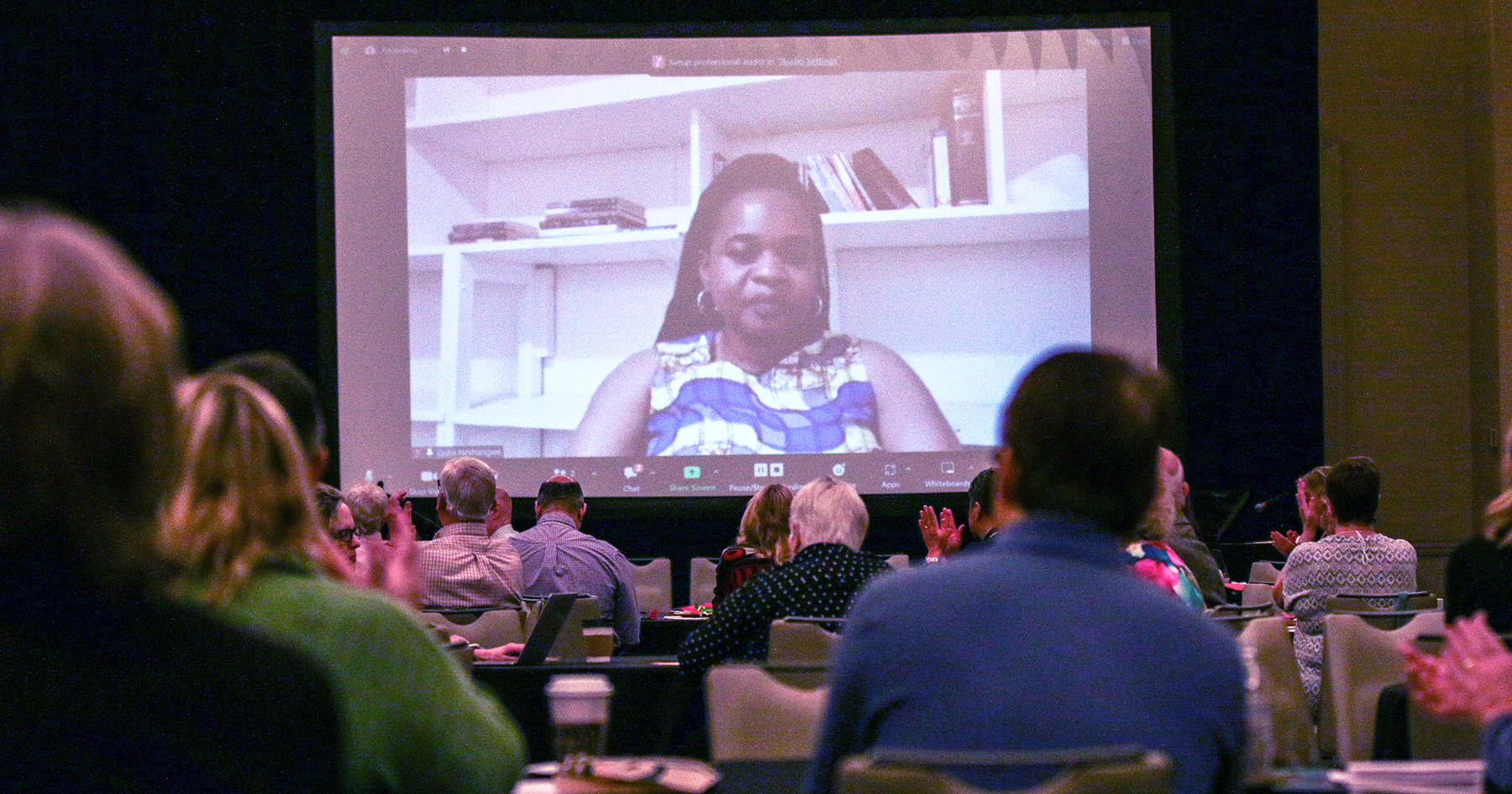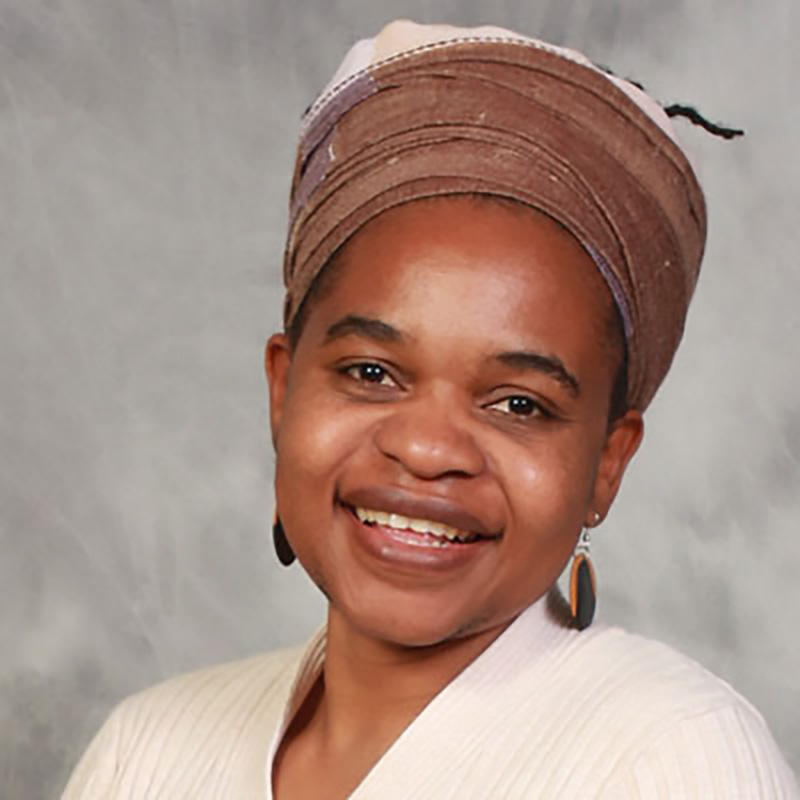
The Rev. Lydia Neshangwe spoke via Zoom to the Polity, Benefits and Mission Conference Thursday from her office in Zimbabwe. Photo by Randy Hobson.
Appearing via Zoom from her office in Zimbabwe Thursday, the Rev. Lydia Neshangwe delivered a rich and full plenary — one that even included a mathematical parable — to those attending the Polty, Benefits and Mission Conference.
Neshangwe, a former International Peacemaker who completed seminary while under care of the Presbytery of Denver and sits on the PC(USA)’s Global Partners Roundtable, shared a conundrum called The Parable of the Difficult Will, which she heard from a friend.
A man dies, leaving his three children 17 camels. The will states the oldest child was to receive half the inheritance, the middle child 1/3 and the youngest 1/9. Unable to divide 17 by 2, 3 or 9, the children begin arguing before taking their case to the village sage.
The man listens to their arguments, then adds one of his own camels to the inheritance. Now the father’s formula works: nine camels are awarded to the oldest child, six to the middle child and two to the youngest. The sage takes back the camel he inserted into the mix, and peace ruled among the siblings.
“What do we learn? Have the humility to consult someone from outside ourselves,” Neshangwe said. The temptation for Christ’s church in the United States “is to look inside itself … The body of Christ is wider than the PC(USA), wider than America,” she said.
It’s also vital to trust that there’s a solution, she said. Some people listening to her presentation “have been in the PC(USA) for a long time. You feel like you’re part of the furniture of the PC(USA). Cynicism and skepticism can creep in. We all need to believe there is a solution to anything we face as the PC(USA).”
Engage in creative thinking to devise possible solutions, she suggested, and then “add to your gifts, talents and ability.” That’s what the sage did in the parable, and it’s mightily needed to help to bring peace to places including Gaza and Ukraine. “There might be some entity that can step in to provide that extra camel into the situation,” she said. “We can bring in our gifts of mediating, negotiating and talking to the powerful.”
“In congregations and mid councils,” she told the room full of mid council leaders, “we need to think about what our common denominator is. What is our common mission? That will help us move forward as we learn,” just as those three siblings did, “there is a solution to whatever it is we are facing.”

The Rev. Lydia Neshangwe

The Rev. Lydia Neshangwe
Neshangwe also explored lessons from two other parables, the Parable of the Talents and the Choluteca Bridge in Honduras, the famous “Bridge to Nowhere” that remained in place following Hurricane Mitch even after the river below it altered its course and the connecting roadways were washed away. Now the government uses the bridge to help drive tourism.
Neshangwe wondered: In what ways can our church be accused of being like that Bridge to Nowhere? “We need to identify without scapegoating the situations in the PC(USA) where the river has shifted,” she said. “Hurricanes happen. We just need to be decent enough to say, ‘Where has the river shifted in the PC(USA)?’ Diagnosis is half the cure.”
We must also “be wise enough to ask God to help identify those bridges to nowhere,” she said. “Which beliefs and traditions may have been of superior quality but now serve no purpose for the PC(USA)?”
“Share the story of the shifting of your river,” Neshangwe recommended. “The bridge in Honduras is not hidden. It’s a popular site for people to see.”
The Parable of the Talents got Neshangwe to thinking about MOs — modes of operation — that can spell trouble for churches. Among those MOs:
- Money-driven. “When [churches] look to Christ and are driven by mission and the Spirit, they have hope.”
- Fear-driven. “Many in the PC(USA) don’t believe they are afraid, but they are. The decisions we make and the resolutions we propose show how much fear we operate under.”
- Self-preservation. “As a woman in Africa, I often find myself going into this mode so I am not taken advantage of or abused by the system or by society. When you exist for your own self-preservation, you are not useable by God.”
- Reaction, including flight, fight or freeze. Neshangwe urged those who tend to flee to “step back into the arena” and for those frozen with fear to ask God “to unfreeze you … Unfreeze and get busy with what God is asking us to do for the church.”
- Control-driven. “The First World leads people to believe they are in control of everything around them.” Her family experienced “re-entry shock” when returning to Zimbabwe after five years living in the United States and realized “in a poor, struggling country like Zimbabwe, you’re not in control of many things … Don’t make the mistake of being driven by control. You can’t control the Spirit. It’s uncontrollable.”
- Blindness, by which Neshangwe referred to spiritual blindness. “I encourage you to operate more by faith than by sight … When the situation is bleak and unsure, we walk by faith.” Fortunately, she said, the PC(USA) “has been gifted” by its leaders, authors, educators and others to help Presbyterians through the current arduous journey.
“God bless you as you do the work you are doing,” Neshangwe said. “We hope we will see you again, in your world or in our world. Thank you.”
She left mid council leaders three questions to discuss with their table mates:
- Which modes of operation have been driving your work?
- Which positive mode of operation do you need to move to?
- What practical actions can you take to create a positive mode of operation?
